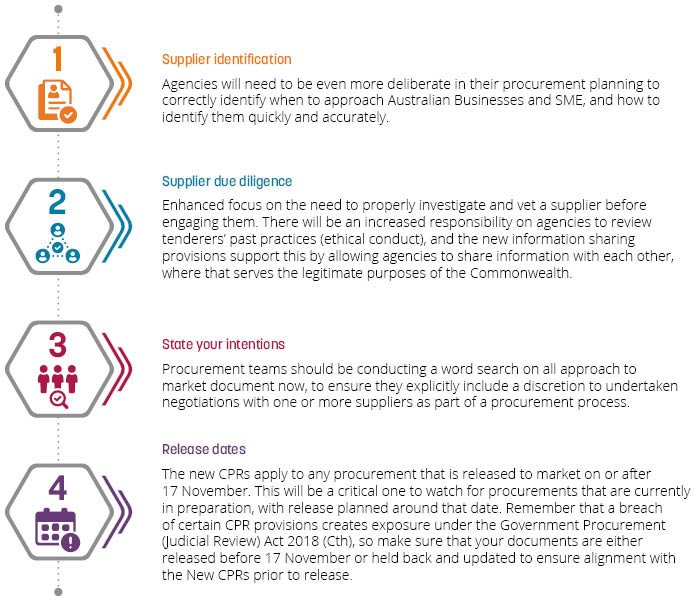Commonwealth Procurement Rules update
06 November 2025
The recently released 2025 Commonwealth Procurement Rules (New CPRs) introduce new requirements prioritising Australian businesses, particularly Small and Medium Sized Enterprises. The New CPRs take effect from 17 November 2025, which is just around the corner. In this article, we survey the changes and highlight the key updates to get across now.
Recap on the Commonwealth Procurement Rules
The Commonwealth Procurement Rules (CPRs) are the rule book for Commonwealth purchasing. Issued by the Minister for Finance under s 105B of the Public Governance Performance and Accountability Act 2013 (Cth) (PGPA Act), the CPRs include both mandatory requirements and best practice guidance for Non-Corporate Commonwealth Entities (NCCEs) and prescribed Corporate Commonwealth Entities (CCEs).
Lifting the procurement threshold
For the first time since the introduction of the CPRs, the threshold above which agencies are required to apply the rules in Division 2 has been increased. The covered procurement threshold for NCCEs has remained steady at $80,000, which over time has fallen behind other jurisdictions. This has now been lifted to $125,000. The threshold for prescribed CCEs remains $400,000 and the construction threshold also remains $7.5m.[1] This creates a temporary overlap with the category of procurements between $80,000 and $200,000 captured by the Mandatory Set Aside provisions of the Indigenous Procurement Policy (IPP), but we do expect to see the IPP recalibrated to align with the New CPR threshold soon.
Australian Businesses and SMEs
Arguably the most significant change to the CPRs is the introduction of the new paragraphs 5.4 and 5.5 in the ‘Encouraging Competition’ section of Division 1.
Australian Businesses
NCCEs will now be required to engage with initially only ‘Australian Businesses’ when procuring goods and services between $10,000 and the relevant procurement threshold, other than when procuring from a standing offer. If, having done so, it is not possible to establish a value-for-money outcome, then other vendors can participate in subsequent procurement activity.[2]
The obligations under the IPP must first be satisfied prior to consideration of Australian and New Zealand businesses, notably the Mandatory Set Aside provisions. This introduces the possibility of a two or even three step process for NCCEs to conduct simple, low value procurements that are outside of an existing standing offer panel.
Finance has already published guidance on how to readily identify an ’Australian Business’ for the purposes of the New CPRs, and we expect businesses will quickly pick up on the need to describe themselves in a way that makes them easy to identify.
Small and Medium Sized Enterprises
Building on the existing exemption for procurement of goods and services from a Small Medium Enterprise (SME) with value up to $500,000,[3] the priority for SMEs has now shifted to existing whole of Australian Government standing offer panels, which make up an increasing share of professional services and technology procurements.
Agencies will now need to first invite only SMEs to requests for quote from the Management Advisory Services panel, the People Panel and standing offer panels managed by the Digital Transformation Agency where the expected value is below $125,000. There is an opportunity to skip this step,[4] but agencies will need to document a clear basis for not approaching only SMEs. In our experience, this justification would need to explain why no SMEs on the relevant panel were considered suitable to approach or were considered not likely to deliver a value for money outcome for the purposes of Division 1 of the New CPRs.
An SME is defined as an Australian or New Zealand Business with fewer than 200 FTE employees.
Ethical conduct of suppliers
The focus on ethical conduct by suppliers continues, and agencies will now need to expressly consider the ethical conduct of a potential supplier in assessing non-price criteria.[5] This makes explicit what was already common practice for some Commonwealth entities but reflects a heightened emphasis on ethical conduct following the recent Senate Inquiry,[6] and builds on other integrity measures including the Commonwealth Supplier Code of Conduct and requirements for transparency in Modern Slavery compliance. We have also been following with interest the recent introduction of a private bill to implement a supplier debarment scheme,[7] such as has been operating in Western Australia[8] and will soon be implemented in New South Wales (as we discuss here).
Sharing of confidential information
Enhancing the use of Commonwealth datasets across government is a key priority of government. The New CPRs support this by confirming that officials should include terms in the request documents and resulting contracts to facilitate sharing of procurement information across Commonwealth entities, where doing so serves the Commonwealth’s legitimate non-commercial interests. The phrase ‘non-commercial’ is notable here: Commonwealth agencies are encouraged to share information about the ethical conduct and compliance of tenderers, but that likely prohibits sharing pricing and other commercial information contained in tenders between Commonwealth agencies.
Negotiations
A slightly unexpected step for the New CPRs was the introduction of explicit provision on the conduct of negotiations[9] following the completion of the evaluation process. The takeaway for all agencies is to ensure that they expressly provide for the possibility of negotiation with one or more parties in all procurement documentation (per 10.6(e)). If that is not done, the new paragraph 10.18(b) arguably prevents negotiation with a single preferred tenderer, and only supports negotiations where no tenderer clearly offers best value for money.
Things to watch

[1] New CPRs, para 9.7.
[2] New CPRs, para 5.4.
[3] New CPRs, Appendix A, para 17.
[4] New CPRs, para 5.5.
[5] New CPRs, para 4.5(c).
[6] Inquiry Into Management And Assurance Of Integrity By Consulting Services (The Senate: June 2024) [Link].
[7] Public Governance, Performance and Accountability Amendment (Ban Unethical Contractors) Bill 2025 (Cth) (Introduced 5 September 2025) [Link].
[8] Procurement (Debarment of Suppliers) Regulations 2021 (WA).
[9] New CPRs, para 10.18-10.19






